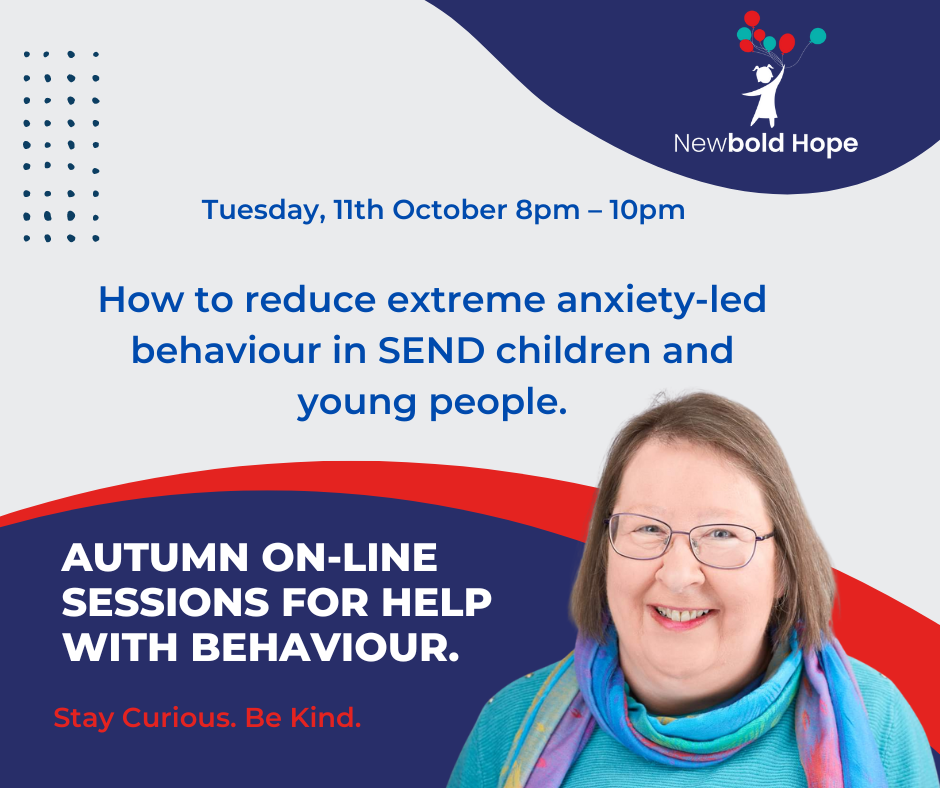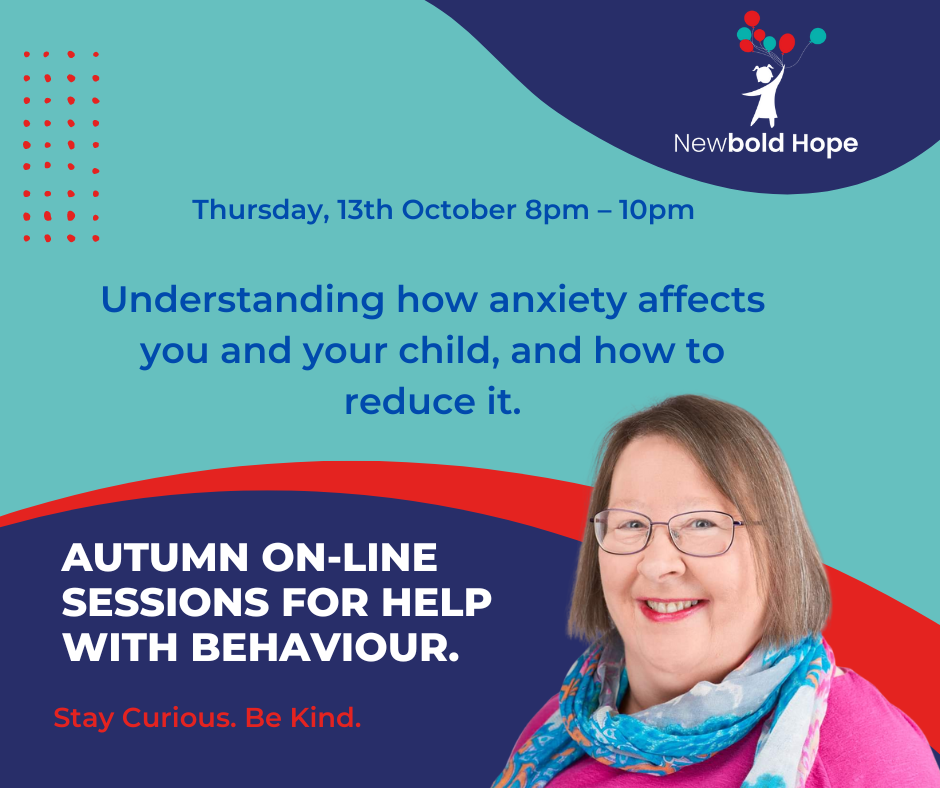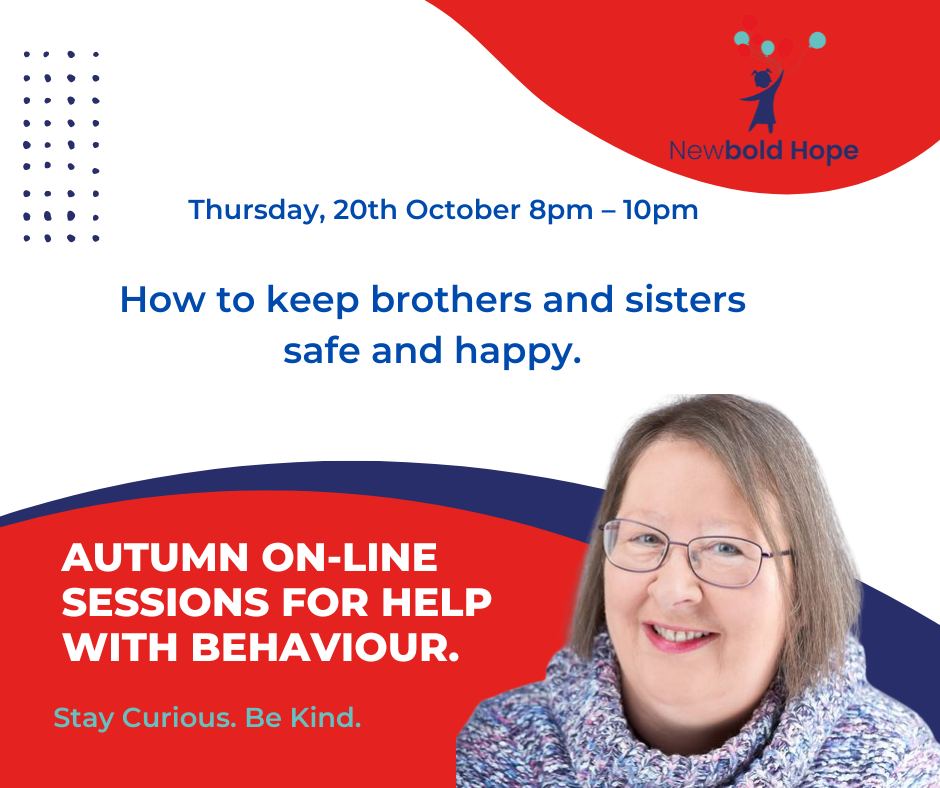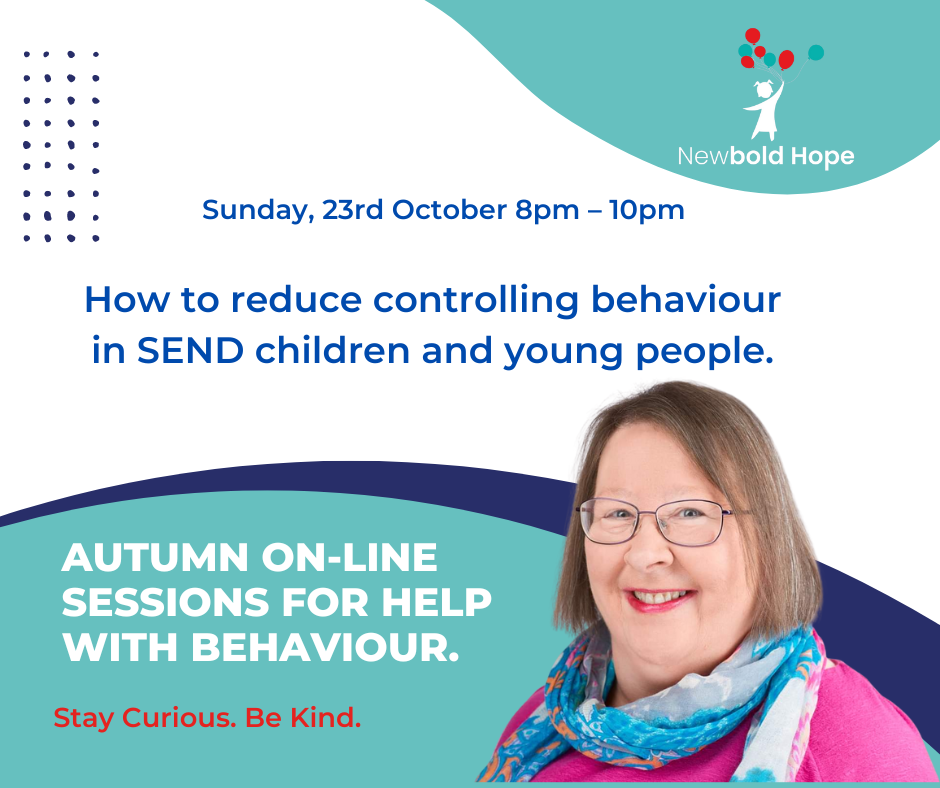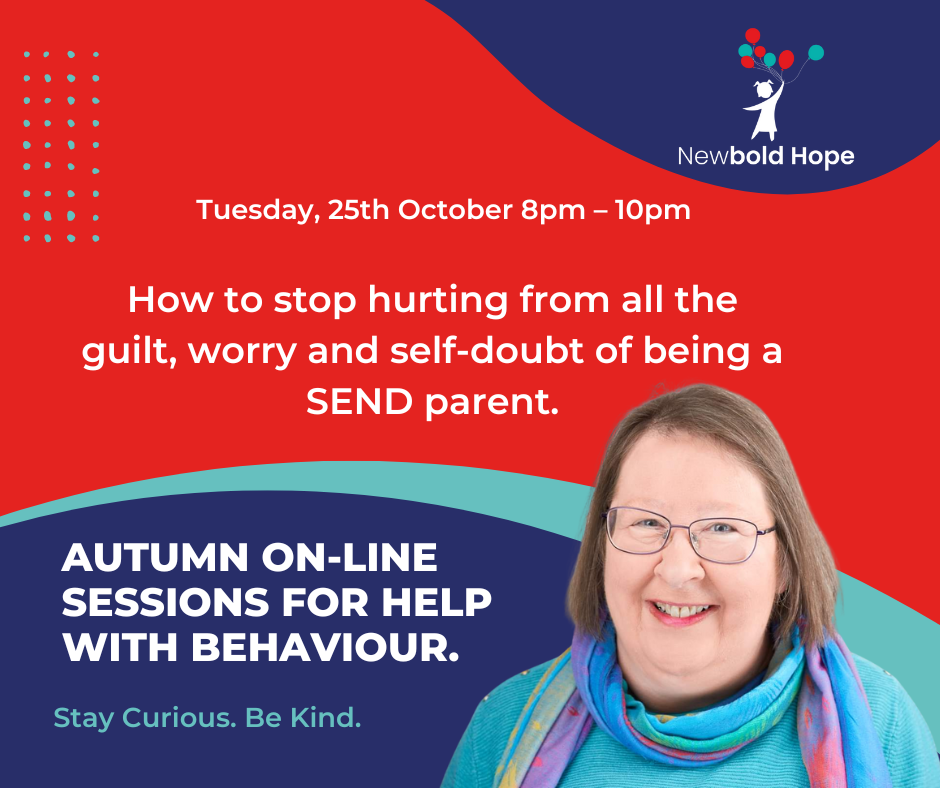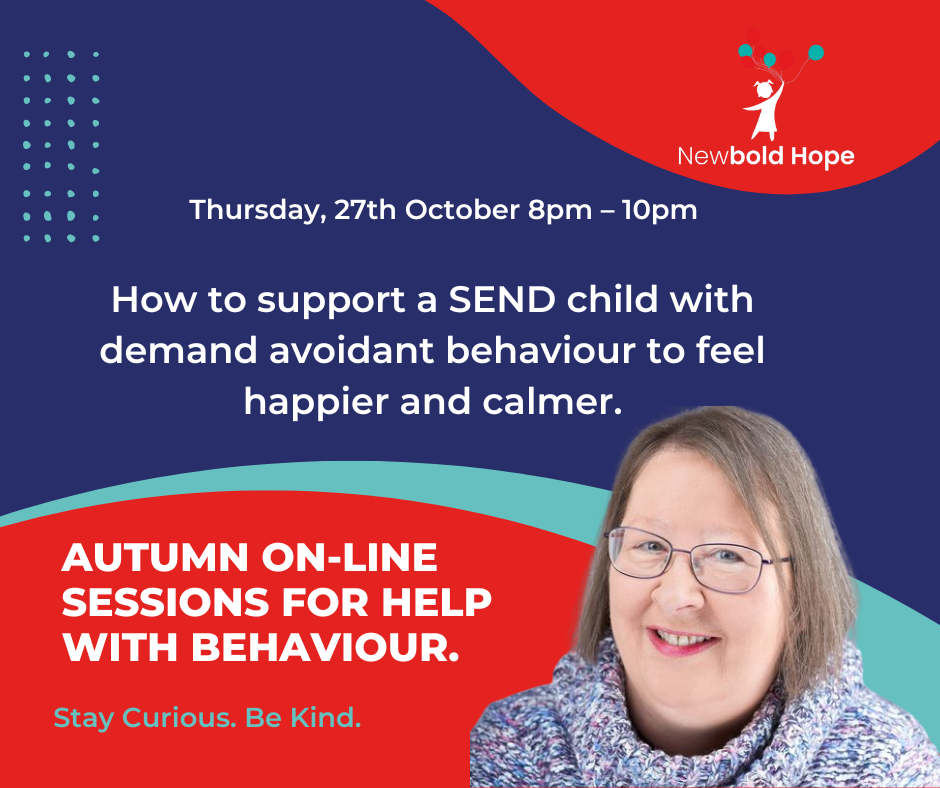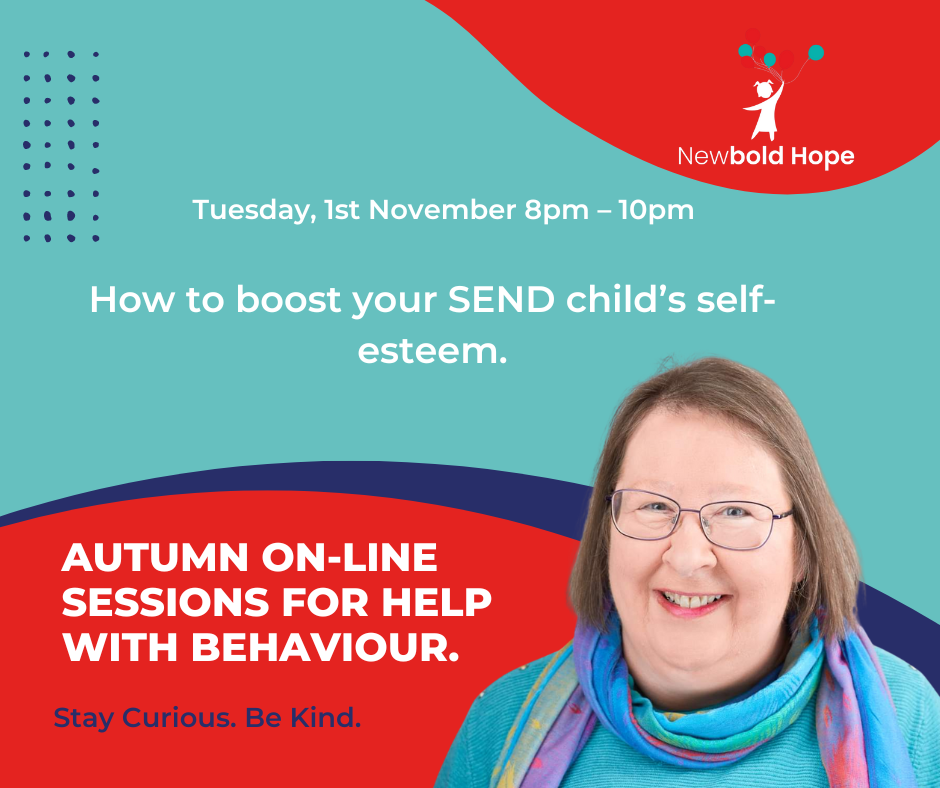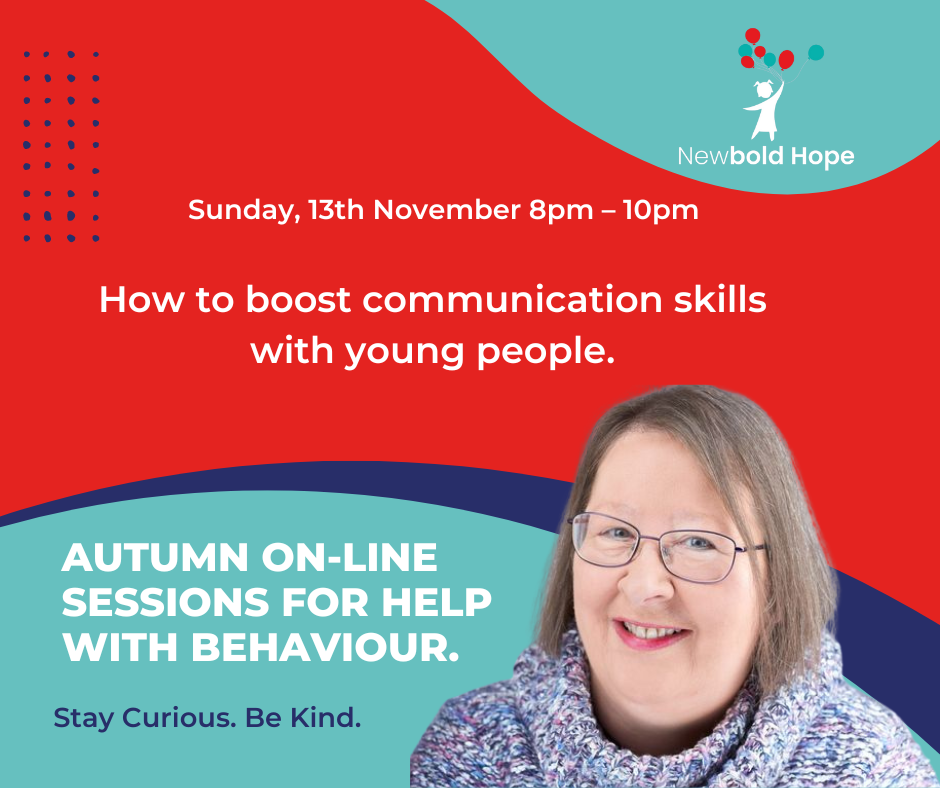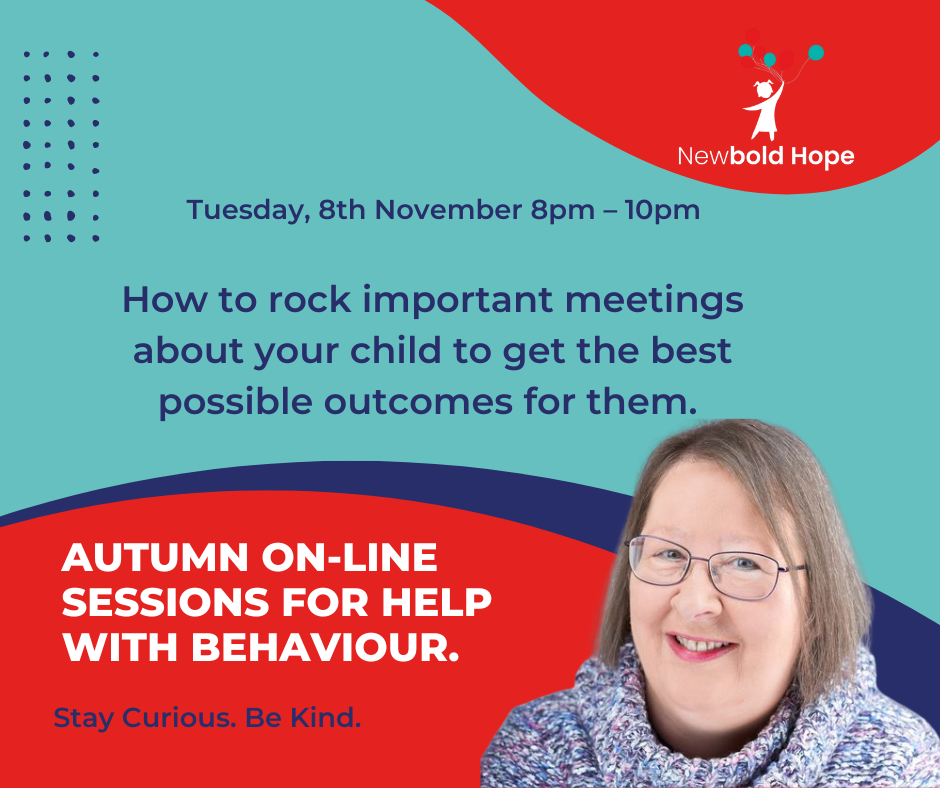Pre-Recorded Webinars
During the Autumn of 2022, Yvonne Newbold, MBE, ran 10 Autumn Training Sessions which were recorded. These 10 sessions are now on sale as recordings for £8.50 each with 4 weeks access from the date of purchase.
The list of 10 seminars can be found by scrolling down the page.
The following list includes all 10 pre-recorded webinars.
Further information about each one can be found by scrolling down the page.
When purchasing, please accept marketing emails as we send the link you need to access the recording out via email. Many thanks.
You will have access to the webinars for 4 weeks from the day of purchase.
How to reduce extreme behaviour in SEND children and young people - This is a great starting point, and will give you a broad overview of how to help your child to become happier and calmer.
Understanding how anxiety affects you and your child, and how to reduce it - This will give you a greater understanding of what anxiety is, how to recognise it, and why it's nearly always the underlying cause of your child's most difficult and dangerous behaviours
How to keep brothers and sisters safe and happy - This session will give you the toolbox you need to help with sibling conflicts and with helping all your children to feel safer, happier, valued and loved.
How to reduce controlling behaviour in SEND children and young people - This session can help you gain the confidence and skills to understand why your child has developed controlling behaviour, and how to help them to relinquish this level of control
How to stop the guilt, worry & self-doubt of being a SEND parent from hurting - When times are really tough because of your child's behavioural difficulties, why do people blame, shame and judge parents instead of offering kindness, understanding and practical help? We'll unpick all of this and more in this session, which is designed to help you to feel stronger, more confident and happier in yourself
How to help a demand-avoidant SEND child feel happier and calmer - This session will give you a much greater understanding of why your child avoids demands and what you can do to help them to feel happier and safer in the world around them
How to boost your SEND child’s self-esteem - Did you know that self-esteem is an accurate indicator of success or failure in every aspect of life? Yet chances are that if your child has developed difficult and dangerous behaviour, that their self-esteem and the self-esteem of their brothers and sisters, is likely to be in their boots. This session will share the skills you need to help your children to feel better about themselves
How to boost communication skills with young people - So often, it's the unnoticed misunderstandings and miscommunications that can escalate behaviour in the blink of an eye. This session will help you identify and resolve communication issues in your family
How to rock important SEND meetings to get the best possible outcomes for your child - Have you ever gone to a meeting about your child and felt unheard, disbelieved, and marginalised? Have you ever felt unable to speak up because you don't trust yourself not to cry or lose your temper? This session is exactly what you need!
How to navigate extreme behaviour in the teenage years - The teenage years can be scary enough for parents, but when there is difficult and dangerous behaviour as well, things can be really tough for the whole family. This session shares so many practical strategies that can really help you both reconnect
How to reduce extreme behaviour in SEND children and young people.
During the session there is a strong focus on solutions, strategies, approaches and the importance of thinking differently.
This is for families who are living with a child who has difficult and dangerous behaviour which may include: -
- Physical violence towards other people and/or pets
- Controlling behaviour
- Self-harm
- Property destruction
- Using inappropriate and offensive language
Some of the issues covered in this webinar are –
- Sensory Issues
- Communication
- Routines
- Resistance to change.
- Transitions
- Masking
- Why it is important to move away from traditional parenting strategies.
- Why it is not your fault, or your child’s fault.
Understanding how anxiety affects you and your child, and how to reduce it.
Joining this session will give you a much greater understanding of why anxiety can have such a significant impact on you, your child and on your family life, and you will have a toolbox full of practical and easy strategies to make life easier on everyone.
Here are just some of the areas we will be covering –
● What is anxiety?
● Common anxieties in children and in adults
● how to recognize symptoms in you and your child
● What anxiety can feel like
● Why getting help is hard
● Why it can cause difficult and dangerous behaviour
● Why anxiety happens.
● Over 50 ways to reduce anxiety in you & your child
How to Keep Brothers and Sisters Safe and Happy.
This session is extremely popular with parents who often carry significant levels of fear and stress about the effect of difficult behaviours on their other children. The two hours are packed full of practical and doable strategies you can use straight away to encourage better relationships between brothers and sisters, regardless of any additional needs.
We'll look at -
- Sibling rivalry
- Conflict
- Communication
- Resentments
- How to handle accusations of unfairness
- How to reduce your own burden of guilt and worry
- How your own painful feelings can get in the way of resolving sibling conflict
- Possible emerging mental health issues in siblings
- How to prioritise safety
- The importance of a safety plan
- How to explain a child's difficulties to siblings
- How to ensure that each of you children know they are loved, valued and included
How to reduce controlling behaviour in SEND children and young people
When a child in the family develops controlling behaviour things can escalate very quickly, but it seldom gets talked about. Because it is so shrouded in secrecy and shame, families often feel alone, isolated, desperate and that they must be the only ones dealing with this. In fact it's incredibly common, which is why this session is so popular. By the end of our two hours together, parents are often feeling relieved and full of hope, with a toolbox of new strategies and the confidence to start implementing them straight away.
The session covers: –
What is control?
What it can look like in children
Why it happens How it's nearly always caused by your child's anxiety
How it makes you, the parent, feel
How other people can make you feel about it
How to get your child back on track
How to stop hurting from all the guilt, worry and self-doubt of being a SEND parent.
Do you get blamed, shamed and judged for your child's behaviour from every direction?
Do you spend hours late at night consumed with guilt about your child with additional needs?
Do you often feel that nothing will ever get better?
Difficult and dangerous behaviour in SEND children is incredibly common, and it's also devastating when it happens in your family. At exactly the time you most need understanding, practical support and kindness, instead it's far too common for parents in this situation to become the target of wrongful accusations and assumptions. This means that when you most need to feel good about yourself so that you have the strength and confidence to best support your child through these difficult times, you're most likely to be feeling hurt, crushed and broken, with your self-esteem in tatters.
This session is all about your own emotional health and well-being, and includes things like:-
● Why your own emotional health matters
● Parent-blame and judgement – why it happens
● How it affects you and what you can do to protect yourself
● Identifying your own psychological needs and how to get them met
● How to manage the very difficult feelings of things like
● Shame
● Anger
● Humiliation
● Fear of failing
● Judgement
● Worry
● Embarrassment
● Feeling that you’re “not enough”
By the end of the session you'll have a much better understanding of why these things cause so much damage, and what you can do to protect yourself from all the unfair things that people can say.
How to support a SEND child with demand avoidant behaviour to feel happier and calmer.
This session looks at why children who are very anxious can also become markedly demand avoidant, and how you can support these children to cope better with everyday life. By the end of our two hours together, parents leave this workshop feeling lighter, more hopeful and optimistic, and with lots of ideas that can help in supporting their child.
We start by looking at: –
● What does “demand avoidant” mean?
● Why being "demand-avoidant" doesn't always mean that a child has PDA
● Why these behaviours happen
● How to identify and address the underlying causes
● Doable tips, tricks and strategies are shared throughout the session
How to boost your SEND child’s self-esteem.
Self-esteem is all about how we think about ourselves and value ourselves. It drives the decisions and choices we make, which in turn influence how we live our lives. This means that self-esteem can determine how successful we are, the quality of our relationships and our academic and career achievements. Left unchecked, it can lead to depression, anxiety, and several other medical conditions. Parents leave the session with a better understanding of why SEND children often have lower self-esteem, together with the skills and several dozen strategies that they can get started on immediately to work with their child to help them to feel much better about themselves.
How to boost communication skills with young people.
Many children and young people have poorer communication skills than we realise, particularly if they also have a disability or an additional need. So often, it's these miscommunications and misunderstanding which can escalate a situation very rapidly, and before you know it, you're all in the thick of some very difficult situations.
That's why this session is so important, with tips, tricks and strategies being shared throughout the full two hours.
The session will help you to develop the confidence to better identify and support your child’s communication needs, with the skills and tools you need to build towards establishing a better quality of communication with your child and your whole family.
Some of the things we'll cover include: -
● Expressive and receptive communication differences
● 10 different common methods of communication
● How all behaviour is a form of communication
● How communication issues can lead to behavioural episodes and how to counter them
● Common communication issues in SEND children and how to address them.
● Rigid thinking and inflexibility, the problems this can cause and how to overcome them.
● The importance of regulating our own tone of voice and how to do that even when emotions are becoming heightened.
● Why “no” can be a trigger word
● Why talking about feelings is so hard for children and what to talk about instead.
How to rock important meetings about your child to get the best possible outcomes for them.
This session is all about sharing the tools that can help you to communicate more confidently and effectively in those meetings where decisions are taken about your child's immediate future. The strategies can be transferred across different situations such as: -
- In school meetings
- With service providers
- On the phone
- In writing
- At medical appointments
- During hospital admissions
- In person or online and in large or small meetings
Some of the issues we will cover include –
- How to decide what your child needs you to ask for.
- Planning and Preparation.
- How to communicate more effectively.
- How to be heard clearly, confidently, and assertively.
- How to be regarded as your child’s expert.
- How to work with professional staff in partnership and collaboration to get the best decisions for your child.
- Meeting Dynamics – what else might be going on in the room?
- How to harness your emotions so they have a positive impact on how you successfully advocate
- After the meeting – useful follow-up strategies.
How to navigate extreme behaviour in the teenage years.

